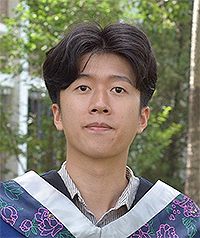Yibing Ma (Lawrence Cohen)

Email: yibing.ma@sund.ku.dk
Twitter: @Mrazylan
Affiliation:
University of Copenhagen
Department for Veterinary and Animal Sciences
Stigbøjlen 4
1870 Frederiksberg C
Education and experience
In June 2017, I obtained the degree of ‘BSc in Biological Sciences’ from Nankai University, China. Through this 4-year programme, I was given the opportunity to study a wide range of topics within the field of biology. It was also during this time that I developed an interest for microbiology. For the last part of my programme, I therefore decided to work on my thesis in the Lab of Molecular Microbiology and Microbial-engineering. I isolated a denitrifying bacteria from sewage and successfully applied it in degradation of total nitrogen in different water samples.
After my BSc’s study, I decided to further my study and research in in the Lab of Molecular Microbiology and Microbial-engineering at Nankai University from September 2017, and obtained the degree of ‘Master in Microbiology’ in June 2020. Through this 3-year programme I got to broaden my understanding of the field of microbiology and specialize in bacteriology. My main work at this stage focused on a novel transcription factor OsaR in Pseudomonas aeruginosa. I initiated an independent project to study the role of OsaR in virulence. Based on Omics data analysis, I constructed gene knockout or overexpressing strains and conducted functional assays. Finally I identified that OsaR regulates motility and biofilm formation, and demonstrated the detailed regulatory mechanism in a peer-reviewed publication. I was also involved in an international project cooperated with Department of Chemistry and Biochemistry, University of Bern, Switzerland. My contribution was to test the activity of novel antimicrobial peptides against various MDR bacteria including Pseudomonas, Staphylococcus, Bacillus, Listeria, etc.
After my MSc’s study, I worked as a research assistant at the University of Hong Kong from December 2020 to May 2021. I worked on construction and screening of transposon library in P. aeruginosa. In addition, I learned how to use CRISPR to edit genome in bacteria. It was a great opportunity for me to keep studying microbiology before my PhD.
ESR 10: Resensitizing of MDR E. coli to antimicrobials
Project description
Antimicrobial resistance (AMR) is a major issue to global health. Enterotoxigenic Escherichia coli (ETEC) is the most common cause of diarrhea in pig farming and causes a great economic loss to the stockbreeding industry. In addition, ETEC infections account for the majority of antimicrobial use in pigs, which considerably increases the risk of AMR development and transmission to humans.
This project aims to identify non-essential genes/proteins that are required to express acquired and intrinsic resistance to macrolides in E. coli, and ultimately use them as drug targets to resensitize ETEC and other pathogenic E. coli to these antimicrobials. Based on previous studies, we hypothesize that specific helper drug targets exist for antibiotics to which Gram-negative bacteria are intrinsically resistant due to outer-membrane impermeability (e.g., macrolides). This hypothesis will be validated by pursuing the following objectives:
- Identify a set of non-resistance genes/proteins that are essential for expression of macrolide resistance in E. coli
- Characterize the function of the identified genes/proteins and the genotype-phenotype relationships associated with resistance/susceptibility to these antibiotics
- Develop a tailored assay to screen libraries of microbial extracts for detecting antibiotic-potentiating compounds that target the identified protein(s)
- Provide a proof of concept showing that this innovative therapeutic strategy based on antibiotic-potentiation can be used for treatment of ETEC infections in pigs
Main work of the project will take place in the One Health Antimicrobial Resistance (OHAR) group at the Department of Veterinary and Animal Sciences (IVH) at University of Copenhagen (UCPH) under the supervision of Luca Guardabassi and Mattia Pirolo. In addition, the project will be carried out in collaboration with the Department of Drug Design and Pharmacology at UCPH and two external collaborators, a drug-discovery enterprise (NAICONs) in Italy and Oxford Brookes University in United Kingdom. The three partner institutions are represented in the PhD supervisory board by Henrik Franzyk, Stefano Donadio, and Mark Poolman, respectively.
